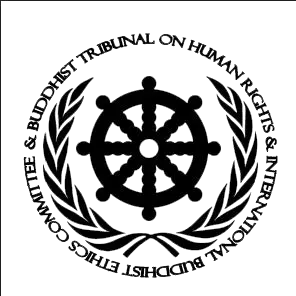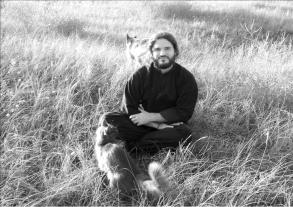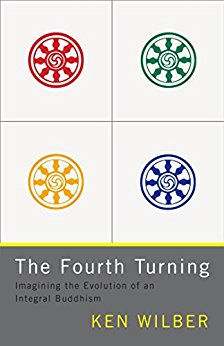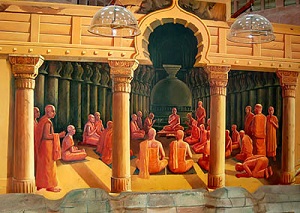|
TRANSLATE THIS ARTICLE
Integral World: Exploring Theories of Everything
An independent forum for a critical discussion of the integral philosophy of Ken Wilber
Ken Wilber on Trial
Buddhist Organization Sues Ken Wilber
for Fraud and Other Charges
Frank Visser
Case No. 31/2017: Ken Wilber
Of course, it is presumptuous for any person or organization to proclaim a Fourth Turning or highest form of Buddhism.
An Anglo-Spanish Buddhist organization called The International Buddhist Ethics Committee (IBEC) recently published a "Judgment on Case Ken Wilber".[1] Since most of the "evidence" used in this "judgment" is based on essays published on Integral World, this website and its webmaster are implicated in this legal affair. In a sense, I should be grateful that this Buddhist organization has found the material on this website of value. On the other hand, as much as I am in favor of strong criticism of all things integral—if only to challenge it and strengthen its case—a legal setting such as this doesn't seem to be the most appropriate arena to find truth. Rational debate should do. This is not to deny ethical considerations regarding Ken Wilber and his work are called for.
It is unclear to me what the legal status is of this International Buddhist Ethics Committee and if these efforts are anything more than symbolic. What serious legal Tribunal would communicate its decisions on a Blogspot blog? Even so, none of these blog pages show any comments. Their webpages are bilingual (English/Spanish) and its contact page lists an address in Hong Kong. Was there a lawyer for the defendant, or was this decision pronounced in absentia? Was Ken Wilber in any way involved?
The International Buddhist Ethics Committee passed the following "Ethical Judgment":

After the analysis of the presentation of the Case and the validation of an enormous amount of evidence, it has proceeded with the voting of 8 members of the Jury, who have judged "Ken Wilber" as Responsible for the serious crimes of Academic Dishonesty, Spiritual Scam and False Buddhism, Violation of Buddhist Law, Crime against Buddhist Cultural Heritage and Violation of Human Rights...
Following the Buddhist Legal Code (Vinaya), the International Buddhist Ethics Committee makes an act of disapproval (Tajjaniyakamma) against Ken Wilber for creating unnecessary disputes and conflicts, for having immoral habits and not practicing good habits, for not having righteous visions and despising the Buddha-Dharma-Sangha, so it is sanctioned that the accused should refrain from teaching or giving spiritual guidance to others indefinitely, much less giving commandments to others or establishing himself as spiritual authority....
In this way, according to Buddhist Spirituality, Ken Wilber's model is a pseudo-religion because it supports religious philosophies without any moral, at the same time that it raises the existence of a Spirit that determines the evolution of beings....
In this way, according to Buddhist Spirituality, the model of Ken Wilber is also a non-consolatory religion because it has speculative arguments and metaphysical foundations, failing to transmit the good life through the Noble Path. (Judgment on Case Ken Wilber)
More specifically, the complaints and accusations against Ken Wilber are dealt with under the following headings:
- Theft [of the concept of Integral Buddhism]
- Violation of Cultural Rights of Buddhist Peoples
- Violation of the Buddhist Precepts
- Misunderstanding of Buddhism
- False Meditation
- Complicity with Sexual Abuser (Adi Da Franklin Jones)
- Complicity with Violent Teacher (Andrew Cohen)
- Spiritual Endorsement to Insane Gurus
- Spiritual Endorsement to Corrupt Religious Teachers
- Appropriation of the Term "Integral"
- Pseudo-Spirituality
- Narcissism & Sectarianism
- Right-Wing Politics
- Ethnocentrism
- Pseudo-Science
- Pseudo-Philosophy
That is quite a list and we won't go into the details of these accusations here, links to the Case details (running over 180 pages) are provided at the bottom of this article. Specific Buddhist themes aside, most of the items listed here resonate with essays published on Integral World over two decades. Unfortunately, the lack of formatting on this blog and the legalese language make for difficult reading.
Integral and Super-Integral Buddhism
The founder of this movement goes by the name "Master Maitreya Samyaksambuddha". Apparently a Westerner who has studied widely in Buddhism and the humanities (his webpage lists over 30 degrees[2]), he serves as President and Judge for this Ethics Committee. For sure no modest spiritual title! In Buddhist tradition, "Maitreya" is the the name of the expected future Buddha: "Maitreya (Sanskrit), Metteyya (Pali), Maithri (Sinhalese), Jampa (Wylie: byams pa) or Di-lac (Vietnamese), is regarded as a future Buddha of this world in Buddhist eschatology. In some Buddhist literature, such as the Amitabha Sutra and the Lotus Sutra, he is referred to as Ajita." (Wikipedia). "Samyaksambuddha" refers to a fully Awakened One, who "teaches the dharma to others after his awakening." Obviously, by calling himself "Maitreya Samyaksambuddha" this Master positions himself in this eschatological tradition. "Maitriyana", the "new way of Buddhism" he has created, can be translated as the "path of loving-kindness". The Ethical Judgment in question, however, is far from friendly in tone.
The website buddhistcourt-gov.net gives the following details about Master Maitreya Samyaksambuddha: "RECTOR of Maitriyana Buddhist University since 2005, creating a New Way of Buddhism called Maitriyana. He also created the model of Perennial Buddhism, Purna (Integral) Buddhism and Mahapurna (Super-Integral) Buddhism. Creator of Buddhist Psychoanalysis in 2007." He founded Maitreya Buddhist University in 2005 and a revolutionary new vision of Buddhism, which was announced in 2012 under the name of Maitriyana.
The phrase "Integral Buddhism" (and "Super-Integral Buddhism") provides the clue to the animosity towards Ken Wilber, who published his The Fourth Turning: Imagining the Evolution of an Integral Buddhism (e-book) in 2015, which was a prepublication of the first part of his recent 800-page volume The Religion of Tomorrow: A Vision for the Future of the Great Traditions-More Inclusive, More Comprehensive, More Complete (2017), published earlier this year. The Maitriyana school feels and claims that Wilber has "stolen" this idea from them -- including the notion of a "Fourth Turning" of the Wheel -- and objects to this strongly as presenting and promoting a false form of Buddhism. A Japanese author from the Maitriyana-school contributed an essay to Integral World some years ago referring to Zen Master Dogen's condemnation of his pupil Senika for believing in the Atman or soul.[3]
Master Maitreya Samyaksambuddha understands Integral (or Purna) Buddhism to be the spiritual unification of all of the Buddhist schools. He presents an overview of earlier attempts at unification, and sees his own system as including, and transcending them all:[4]
- The first model of Integral Buddhism (Purna) was created by Siddharta Gautama himself, who raised the existence of three Spiritual Vehicles (Yanas) in Buddhism.
- The second scheme of Integral Buddhism (Purna) was the One Way (Ekayana) developed in Sutras of Mahayana Buddhism, as for example the Lotus Sutra, recovering an old teaching of Gautama that allowed integrating Hinayana with Mahayana.
- The third scheme of Integral Buddhism (Purna) is posed by means of the Lotus Sutra, proposing the existence of five Buddhist vehicles
- The fourth scheme of Integral Buddhism (Purna) is posed by means of the Abhiniskramana-sutra or Sutra of the Great Renunciation (Chujia Gongde Jing)
- The fifth scheme of Integral Buddhism (Purna) is posed in Chan (Zen) Buddhism, being confirmed that Master Bodhidharma was the one who introduced Ekayana Buddhist School of South India into China.
- As for the sixth scheme of Integral Buddhism (Purna), this one is raised in the Nyingma School belonging to the Vajrayana, creating a model composed of four vehicles
- The seventh scheme of Integral Buddhism (Purna) is raised in the Nyingma School, being based on the energy of the primordial and eternal Buddha or immutable light (samantabhadra).
- As for the eighth scheme of Integral Buddhism (Purna), it is raised in Socially Engaged Buddhism, raising the existence of four pathways: Hinayana, Mahayana, Vajrayana and Navayana.
- Finally, the Maitriyana has a model of Integral Buddhism (Purna) and a model of Super Integral Buddhism (Mahapurna)... In this sense, even Maitriyana has a scheme of Super-Integral Spirituality (Mahapurna Sasana) that dialectically transcends all traditions by means of a practical and theoretical framework of 16 vehicles.
One wonders how "Be a lamp onto yourself" ever got this complicated...
the ‘Buddhization’ of the world
Super-Integral Buddhism is understood by them as the unification of this system of Integral Buddhism with other philosophical or scientific disciplines: "First, Buddhist Psychoanalysis; Second, Buddhist Humanism; Third, Buddhist Transpersonalism, Fourth Buddhist Cognitivism; Fifth, Buddhist Existentialism; Sixth, Buddhist Stoicism; Seventh, Buddhist Surrealism; Eighth, Buddhist Relativism; Ninth, Buddhist Ecologism; Tenth, Buddhist Socialism; Eleventh, Buddhist Anarchism; Twelfth, Buddhist Abolitionism; Thirteenth, Buddhist Ecumenism; Fourteenth, Buddhist Messianism; Fifteenth, Buddhist Gnosticism; Sixteenth, Buddhist Mysticism." And it also touches the other great religions, leading to a veritable "Buddhization of the world":
At the same time, these latter three meta-religious pathways are composed of three internal sub-pathways that have the Purpose (Dharma) of realizing the Buddhization of the world: First, Buddhist Judaism; Second, Buddhist Christianity; Third, Buddhist Islamism
By contrast, Integral Theory understands "Integral Buddhism" to mean the application of the (neutral and cross-disciplinary?) Integral model to various fields of knowledge and expertise, both religious and wordly: for example, Integral Buddhism, Integral Christianity, Integral Islam, integral management, integral politics, integral healthcare, integral philosophy, integral justice, etcetera, etcetera -- to "AQAL-ize" or "Wilberize" every field of human endeavor if you want. As such Integral Theory is much broader in scope and less imperialistic, it doesn't limit itself to one spiritual tradition such as Buddhism (however rich and valuable that tradition might be). It doesn't take one tradition to be paradigmatic for all others.
And when it comes to who's first, Wilber started to use the term "integral" explicitly around 2000, with the foundation of the (now defunct) Integral Institute with its many departments and offshoots (such as the popular media-channel Integral Naked and Integral University—which was announced in 2004 but never actually materialized). Currently IntegralLife.com is the digital flagship of the Integral movement. We see the same pattern in both movements of explosively applying a single concept as an umbrella term to numerous fields of academic or religious study. Incidentally, for a while the label "integral" has been replaced by "evolutionary" in recent years for many of the Wilberian applications—not to be confused with the neo-Darwinian evolutionary disciplines. Integral students became "evolutionaries" following an "evolutionary spirituality". Be that as it may, both the Wilberian-Integral and the Maitriyana-Buddhist models exhibit a huge degree of grandiosity.
The danger of misinterpreting these traditions -- to make them fit into the integral model -- is always something that needs to be guarded for, and perhaps representatives of these traditions are the best candidates to spot any of these misunderstandings. On the other hand, any integrative undertaking will by definition be selective to some and dismissive of other aspects of the traditions it integrates. This seems to be unavoidable. This raises the question if such grand scale integrations are feasible at all. The Integral model seems to have sufficient neutrality (though this is debated by those who see it as a primarily idealistic and progressive system).
There is a little irony here: the Maitriyana Buddhist University (MBU) granted in 2013-2014 honorary PhD's and "other awards" to various psychological and philosophical thinkers, including Stanislav Grof, Michael Washburn, Mark Epstein, Edgar Morin and... Ken Wilber—so his contributions were not entirely worthless after all?:
For having great humility, in the first months of 2013 the World Association of Buddhism created an academic project that consisted of awarding transpersonal thinkers, Buddhists and philosophers around the world. These awards were honorary PhDs delivered by Maitreya Buddhist University, which successfully granted PhDs to thinkers such as Stanislav Grof, Michael Washburn, Mark Epstein, David Brazier, Edgar Morin, Jin Park and Juan Arnau, all of whom accept their awards. Other awards were also offered to other transpersonal thinkers such as Fritjof Capra, Rupert Sheldrake and Ken Wilber, among others. The answer of the Integral Institute was that Mr. Wilber was going to analyze the Maitreya Buddhist University's website (where it was publicly announced Integrative Buddhism and the projects of the World Association of Buddhism).
But a year later, in 2014, the Maitriyana Community was informed by a Buddhist monk that Mr. Wilber was creating "Integral Buddhism", performing a "fourth turning of the Dharma wheel" and that he was about to publish a book on "The future of Buddhism". In the face of this unprecedented dishonorable act in the history of world philosophy, the Maitriyana Community communicated with Frank Visser in order to try to understand what was happening in Mr. Wilber's mind, for this seemed a psychopathological behavior.
As an empathetic educational organization, Maitreya Buddhist University shared this fact with its students and it was agreed not to take legal actions, hoping that Mr. Ken Wilber would simply abandon his illegal action. In addition, it was considered that the goal of Mr. Wilber's work indirectly revalidated the Integral Buddhism created by Master Maitreya. Furthermore, during 2014 the "Seventh Buddhist Council"[5] was held with about one thousand Buddhists from around the world, in a historic event in which it was agreed to incorporate the model of "Purna (Integral) Buddhism" created by His Eminence Master Maitreya Samyaksambuddha into the official Buddhist Canon. In said "Seventh Buddhist Council" it was also created the International Buddhist Ethics Committee & Buddhist Tribunal on Human Rights.
However, by re-usurping the Buddhist cultural heritage, in 2017 Ken Wilber wrote another book on "Integral Buddhism" [The Religion of Tomorrow] without recognizing who are the legitimate creators and masters of the movement, thus continuing with the deception that he is the genuine creator of Integral Buddhism.[1]
In my opinion, "Integral Buddhism", "Fourth Turning" and even the term "Integral" are not protected or trademarked brands that can be defended or claimed in a legal court. Every author, from Sri Aurobindo to Ken Wilber, will give this concept of "Integral" their own connotations. Who has the better understanding of Buddhism and its concepts has been fought out in Dharma combat throughout the centuries of Buddhist history, and in this case, a more academic argument about Wilber's supposed misunderstandings in this field, with direct quotes from his own works, would have been more effective. As to the other accusations—support for dubious gurus and teachers and questionable use of scientific and philosophical ideas—this should remain the domain of free and open critical discourse, as has been promoted on Integral World for two decades. The installation of an Integral Ethical Committee would perhaps be a good start (I am sure this has been tried in the past).
Of course, it is presumtpuous for any person or organization to proclaim a Fourth Turning or highest form of Buddhism. Pot and kettle are not far away in this respect:
"Oho!" said the pot to the kettle;
"You are dirty and ugly and black!
Sure no one would think you were metal,
Except when you're given a crack."
"Not so! not so!" kettle said to the pot;
"'Tis your own dirty image you see;
For I am so clean - without blemish or blot -
That your blackness is mirrored in me.
NOTES
[1] Case No. 31/2017: Ken Wilber, September 20th, 2017. The full Case description can be found here: buddhisttribunal.blogspot.com:
[2] "Governing Council: President and Judge", buddhistcourt-gov.net
[3] Taisen Saito, "The Heresy of Ken Wilber", 2014, www.integralworld.net. Ken Wilber's book The Atman Project (1980) appears to be of course an Exhibit A for such a typical Buddhist heresy, since Buddhism supposedly denies the Self or Atman. However, Wilber's explanation of the Buddhist anatta doctrine in Sex, Ecology, Spirituality (1995), explaining how this is often misunderstood to mean there is no Self at any level of existence, is sophisticated enough to give one pause. "Absolute reality, then, is neither self nor no-self, neither substance nor flux, neither permanent nor impermanent, nor any other combination of such dualistic notions, but rather is the nondual Emptiness of all phenomena, all views, all stances." (p. 694)
[4] Master Maitreya Samyaksambuddha, Super-Integral Buddhism (Mahapurnayana), maitriyana.com, 2017/08/25.
[5] See: "Buddhist Councils", Wikipedia. This "Seventh Council" is not mentioned here. Historically there have been six Buddhist Councils:
- First Buddhist council (c. 400 BCE)
- Second Buddhist council (334 BCE)
- Third council (250 BCE)
- Fourth Buddhist Councils (1st century)
- Theravada Buddhist council in 1871 (Fifth Buddhist Council)
- Theravada Buddhist council in 1954 (Sixth Buddhist Council)
Maitriyana initiatives:
- Seventh Buddhist Council, First Mahayana-Theravada Council, First Maitriyana Council, 2014
- Eigth Buddhist Council, announced for 2015 (status unclear). Second Maitriyana Council and the First Buddhist Ecumenical Council
|

 Frank Visser, graduated as a psychologist of culture and religion, founded IntegralWorld in 1997. He worked as production manager for various publishing houses and as service manager for various internet companies and lives in Amsterdam. Books: Ken Wilber: Thought as Passion (SUNY, 2003), and The Corona Conspiracy: Combatting Disinformation about the Coronavirus (Kindle, 2020).
Frank Visser, graduated as a psychologist of culture and religion, founded IntegralWorld in 1997. He worked as production manager for various publishing houses and as service manager for various internet companies and lives in Amsterdam. Books: Ken Wilber: Thought as Passion (SUNY, 2003), and The Corona Conspiracy: Combatting Disinformation about the Coronavirus (Kindle, 2020). 


